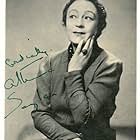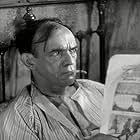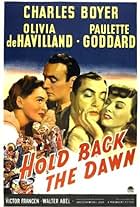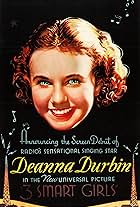NOTE IMDb
7,0/10
2,5 k
MA NOTE
Un jeune médecin enthousiaste se lance avec joie dans sa carrière, mais il ne tarde pas à découvrir ce qu'implique réellement le métier de médecin.Un jeune médecin enthousiaste se lance avec joie dans sa carrière, mais il ne tarde pas à découvrir ce qu'implique réellement le métier de médecin.Un jeune médecin enthousiaste se lance avec joie dans sa carrière, mais il ne tarde pas à découvrir ce qu'implique réellement le métier de médecin.
- Réalisation
- Scénario
- Casting principal
- Nommé pour 4 Oscars
- 9 victoires et 4 nominations au total
Penelope Dudley-Ward
- Toppy LeRoy
- (as Penelope Dudley Ward)
Francis L. Sullivan
- Ben Chenkin
- (as Francis Sullivan)
Avis à la une
Very good film from King Vidor with a great look and a mostly excellent cast, take from the classic novel by A Cronin. Robert Donat as Dr. Manson, a highly-principled physician who struggles with the conflicting demands of his profession, provides an uneven central performance. It is sometimes hard to understand his motivations and this is the film's biggest weakness. Rosalind Russell does a fine job as his ever-faithful, often suffering wife. Her performance is perfect, and does provide a moral core to the film. The film wisely avoids a lot of details of the novel that would have muddied up the storyline. (In the book, Dr. Manson has an affair with one of society patients.) The film also boasts some fine performances from a very young Rex Harrison and Ralph Richardson. In fact, Richardson's role as an idealistic, though flawed doctor steals the spotlight every time he is on the screen. The film also has a great look, especially the outdoor scenes of the British villages.
The Citadel is a fine and inspirational film about a dedicated young doctor and the hardships he has to overcome to see his destiny and move to fulfill it. A lot of the same ground was covered before in Arrowsmith and would be covered again in Not As A Stranger and then in over a dozen or more medical drama shows on television. Stories about medicine and its practice is a genre we will never tire of.
Robert Donat plays the idealistic young doctor who is assigned a number of positions in Great Britain and the story is how he deals with the various situations he encounters. Along the way he picks up a wife in the person of Rosalind Russell.
For an American to review this film probably one should have a knowledge of the British health system and remember this would have been before the days of the current health system of socialized medicine. That system was put in before the post World War II Labour government changed things.
One of his assignments is a coalmining area in Wales and Donat because of his own integrity and commitment manages to make a whole bunch of enemies and has to leave. His assignment is in what might be described as an HMO run by the coal miner's union. He starts doing research in a chronic cough he notices several of the miners have and upsets a whole lot of applecarts both with labor and management. He also isn't so easy with giving sick slips to malingering workers and they don't come to his defense. Not easy at times to be an idealist.
For a while Donat takes an easy road in a wealthy sanitarium that caters to upper class hypochondriacs. Doctors Felix Aylmer and Rex Harrison are getting rich themselves off them. But eventually Donat finds his true calling in research.
Rosalind Russell said that working with Donat was a pleasure, but the film itself wasn't. She and Director King Vidor were the only Americans in this film and she and Vidor took a lot of criticism for taking jobs away from British players. Not like she had anything to say about it, MGM loaned her out there. Still she did her job without a trace of a British accent.
Besides Aylmer and Harrison other noteworthy British players in the cast are Emlyn Williams and Francis L. Sullivan. Williams is one of the local union heads and Sullivan is a blustering boorish lout of a miner who leads the opposition to Donat's research. All of them do fine jobs and Harrison got his first real notice by American audiences in his role.
Because for two generations we Americans have been awash with medical dramas all these situations seem all to familiar to us. That's a jaded point of view. The Citadel is a fine drama and worth seeing.
Robert Donat plays the idealistic young doctor who is assigned a number of positions in Great Britain and the story is how he deals with the various situations he encounters. Along the way he picks up a wife in the person of Rosalind Russell.
For an American to review this film probably one should have a knowledge of the British health system and remember this would have been before the days of the current health system of socialized medicine. That system was put in before the post World War II Labour government changed things.
One of his assignments is a coalmining area in Wales and Donat because of his own integrity and commitment manages to make a whole bunch of enemies and has to leave. His assignment is in what might be described as an HMO run by the coal miner's union. He starts doing research in a chronic cough he notices several of the miners have and upsets a whole lot of applecarts both with labor and management. He also isn't so easy with giving sick slips to malingering workers and they don't come to his defense. Not easy at times to be an idealist.
For a while Donat takes an easy road in a wealthy sanitarium that caters to upper class hypochondriacs. Doctors Felix Aylmer and Rex Harrison are getting rich themselves off them. But eventually Donat finds his true calling in research.
Rosalind Russell said that working with Donat was a pleasure, but the film itself wasn't. She and Director King Vidor were the only Americans in this film and she and Vidor took a lot of criticism for taking jobs away from British players. Not like she had anything to say about it, MGM loaned her out there. Still she did her job without a trace of a British accent.
Besides Aylmer and Harrison other noteworthy British players in the cast are Emlyn Williams and Francis L. Sullivan. Williams is one of the local union heads and Sullivan is a blustering boorish lout of a miner who leads the opposition to Donat's research. All of them do fine jobs and Harrison got his first real notice by American audiences in his role.
Because for two generations we Americans have been awash with medical dramas all these situations seem all to familiar to us. That's a jaded point of view. The Citadel is a fine drama and worth seeing.
"The Citadel" is one of those circular morality fables - idealistic young man sets out full of good intentions to put the world to right, but, finding his dreams dashed by prejudice and ignorance, throws in his lot with the protection of an easy but dishonest life only to realise the error of his ways through personal tragedy with consequent redemption. A;though stylistically and culturally a world apart, it is thematically a precursor of Mizoguchi's "Sansho Dayu". Made in great Britain in 1938, its MGM backing certainly shows in higher production values than most home grown films of the period - and this in spite of much reliance on back projection of the sort that even the great Carol Reed could not always effectively disguise. One of Hollywood's top directors, King Vidor, invests it with visual quality and, in a part that could have been tailored for Greer Garson, Rosalind Russell makes a surprisingly convincing female lead, supporting the hero throughout his tribulations with every ounce of Garsonian understanding he needs. But it is Robert Donat as the idealistic doctor, who first tries his professional hand in the dark Welsh colliery valley, that is the film's greatest strength. Here was an actor who brought a sense of dignity and integrity to every role he undertook from the earliest Richard Hannay to the Chinese nobleman in "The Inn of the Sixth Happiness" which he was brave enough to play when he was literally gasping for breath. His performance in "The Citadel" is not entirely free from cliché but I imagine this was something imposed by the conventions of the period. How else to explain that when he becomes mean and mercenary he suddenly sports a very short and unsympathetic moustache which, if memory serves me right, miraculously disappears for the final scene of redemption. For the rest there is a galaxy of British acting talent to be found among the supporting roles with a brief glimpse of the dignified Nora Swinburne and a few more of a youthful Francis L. Sullivan doing his obese bigot stuff with rather less brains than usual. And as if this was not all, there is "Sexy Rexy" Harrison gracing the Harley Street scene, Cecil Parker playing a particularly odious surgeon who would no doubt be struck off the Medical Register if he were around today and the great Ralph Richardson investing the role of Donat's best friend with just about the right amount of Shakespearean rhetoric that the part will support. All in all a veritable treat provided you suspend just a little bit of disbelief.
This is a wonderful film that deserves to be seen by a wider audience than it currently receives. The screenplay of "The Citadel" is excellent and deals with issues that have a continuing relevance today. Indeed, its theme--the importance of having a strong sense of vocation and integrity --especially among medical doctors, will probably always retain its original significance.
Robert Donat plays a physician who starts out as an idealistic young man working in a poor Welsh coal mining district, but after a series of disappointments he leaves and becomes a cynical member of a London clinic for rich patients, practising the kind of assembly line medicine that is all too common today in many countries. It is likely, however, that the film had a definite influence in countries like the United Kingdom and Canada, which developed publicly-funded medical plans after World War Two.
But even the best universal health care systems can still be prone to such problems as inequities in the availability or quality of treatment and incompetent or uncaring doctors, interested only in making money. Moreover, the issues of professional ethics, individual conscience and personal commitment are applicable to many other occupations, as we've recently seen in the cases of corrupt corporations, such as Enron, which have also abused people's trust.
The other main virtue of this film lies in the acting of Robert Donat. Sir Laurence Olivier once stated that Robert Donat would have been a greater actor than Olivier himself was, had it not been for the chronic asthma that plagued Donat throughout his life and ultimately killed him. That terrible respiratory illness may have inspired him, in "The Citadel," to give one of the most sensitive and moving performances I have ever seen on film, during the scene in which Dr. Manson gets a baby, thought to have died, to breath again.
Donat's complete mastery of what the legendary Konstantin Stanislavsky called "tempo-rhythmn" gives a palpable urgency to this scene that is unforgettable. Watch his delicate and expressive use of his hands while he works to save the infant he's holding. These are the hands of a great actor giving life to a scene, and, at the same time, the hands of a great doctor giving life to a child.
This is acting of the highest order, and if you want to see what the real "Stanislavsky Method" (and not the inferior misinterpretation of it by Lee Strasberg) was all about, Donat's performance in this scene remains as magnificent a demonstration of its goal of emotional truth as I have ever witnessed in many years of watching theatre and film. The rest of his performance is equally brilliant. The changes in his face perfectly convey the degrees by which the former idealist becomes a jaded opportunist, and then. . .
Well, I don't want to be a spoiler and give the whole story away! I highly recommend "The Citadel" to anyone who enjoys films that have real meaning, or who appreciates the true, and truthful, art of acting--acting that is so brilliant and free from any trace of mannerism and artifice that we forget we're watching acting at all. We're seeing life and art unfold together. Thanks to the talent of Robert Donat, form and content become one: his concern with integrity and the film's concern with it simply merge into an inseparable artistic unity. This is a cinematic experience that nobody should miss.
Robert Donat plays a physician who starts out as an idealistic young man working in a poor Welsh coal mining district, but after a series of disappointments he leaves and becomes a cynical member of a London clinic for rich patients, practising the kind of assembly line medicine that is all too common today in many countries. It is likely, however, that the film had a definite influence in countries like the United Kingdom and Canada, which developed publicly-funded medical plans after World War Two.
But even the best universal health care systems can still be prone to such problems as inequities in the availability or quality of treatment and incompetent or uncaring doctors, interested only in making money. Moreover, the issues of professional ethics, individual conscience and personal commitment are applicable to many other occupations, as we've recently seen in the cases of corrupt corporations, such as Enron, which have also abused people's trust.
The other main virtue of this film lies in the acting of Robert Donat. Sir Laurence Olivier once stated that Robert Donat would have been a greater actor than Olivier himself was, had it not been for the chronic asthma that plagued Donat throughout his life and ultimately killed him. That terrible respiratory illness may have inspired him, in "The Citadel," to give one of the most sensitive and moving performances I have ever seen on film, during the scene in which Dr. Manson gets a baby, thought to have died, to breath again.
Donat's complete mastery of what the legendary Konstantin Stanislavsky called "tempo-rhythmn" gives a palpable urgency to this scene that is unforgettable. Watch his delicate and expressive use of his hands while he works to save the infant he's holding. These are the hands of a great actor giving life to a scene, and, at the same time, the hands of a great doctor giving life to a child.
This is acting of the highest order, and if you want to see what the real "Stanislavsky Method" (and not the inferior misinterpretation of it by Lee Strasberg) was all about, Donat's performance in this scene remains as magnificent a demonstration of its goal of emotional truth as I have ever witnessed in many years of watching theatre and film. The rest of his performance is equally brilliant. The changes in his face perfectly convey the degrees by which the former idealist becomes a jaded opportunist, and then. . .
Well, I don't want to be a spoiler and give the whole story away! I highly recommend "The Citadel" to anyone who enjoys films that have real meaning, or who appreciates the true, and truthful, art of acting--acting that is so brilliant and free from any trace of mannerism and artifice that we forget we're watching acting at all. We're seeing life and art unfold together. Thanks to the talent of Robert Donat, form and content become one: his concern with integrity and the film's concern with it simply merge into an inseparable artistic unity. This is a cinematic experience that nobody should miss.
A look at the medical profession today will convince anyone that this narrative of the conflict a sensitive young physician experiences: whether to serve the not-especially-appreciative poor or the hypocond- riac and over-appreciative wealthy, if he caters to their whims. (At the end one wonders how great a difference there is between these two constituencies.) How many medical school graduates today choose to into small-town or rural general practice, as opposed to pursuing lucrative specialist careers? Robert Donat's effective performance is, as usual, understated; while Rosalind Russell easily matches him in a portrayal that makes one regret that she later became typed in comic roles as a result of superb performances in that genre. A supporting cast that includes the youthful Rex Harrison, Emlyn Williams and Ralph Richardson, all early in their careers and all with perfectly formed characteriza- tions, gives the film depth that one might not have anticipated. This is one of those films that makes one regret the loss of the old studio system, which enabled MGM, with its guaranteed bookings, to make a prestige film on a serious social issue with relatively few melodramatic excesses; and to offset probable box office losses by the studio's many box office bonanza romantic, comic or musical star vehicles. And today??
Le saviez-vous
- GaffesWhen Andrew examines Christine's throat, he sits in front of a light that is supposedly reflected into Christine's mouth by his eyepiece. We see this from over Andrew's shoulder, and when the light is directed into her mouth, it is clearly coming from behind Andrew, because the back of his eyepiece is illuminated.
- Citations
Christine Barlow Manson: Andrew, Do you remember once telling me that a all good research man needed was a notebook, a microscope and a room with a roof over it?
- Crédits fousPrologue: "This motion picture is a story of individual characterizations and is in no way intended as a reflection on the great medical profession which has done so much towards beating back those forces of nature that retard the physical progress of the human race."
- Versions alternativesAlso shown in computer colorized version.
- ConnexionsFeatured in The Ultimate Film (2004)
Meilleurs choix
Connectez-vous pour évaluer et suivre la liste de favoris afin de recevoir des recommandations personnalisées
- How long is The Citadel?Alimenté par Alexa
Détails
- Date de sortie
- Pays d’origine
- Langue
- Aussi connu sous le nom de
- La ciudadela
- Lieux de tournage
- Abertillery, Blaenau Gwent, Pays de Galles, Royaume-Uni(Village scenes)
- Société de production
- Voir plus de crédits d'entreprise sur IMDbPro
- Durée1 heure 50 minutes
- Couleur
- Rapport de forme
- 1.37 : 1
Contribuer à cette page
Suggérer une modification ou ajouter du contenu manquant






































